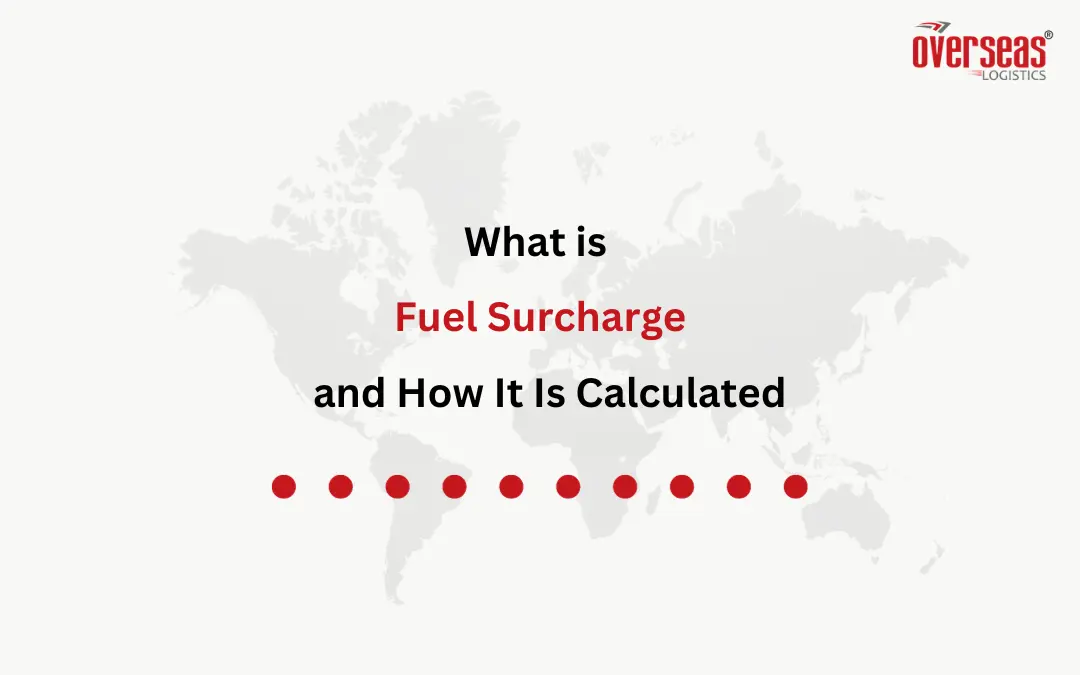In the intricate world of logistics and transportation, understanding the concept of fuel surcharge is paramount. This crucial element plays a pivotal role in the dynamics of shipping costs, influencing businesses and consumers alike. In this comprehensive guide, we delve into the depths of what fuel surcharge entails and demystify the calculations behind it.
What is a Fuel Surcharge?
Fuel surcharge, often abbreviated as FSC, is an additional fee imposed by transportation providers to offset the fluctuations in fuel prices. This surcharge is applied to the overall shipping cost and serves as a mechanism to adapt to the unpredictable nature of fuel expenses. In essence, it ensures that shippers remain solvent despite the ever-changing fuel landscape.
Factors Influencing Fuel Surcharge
Understanding the variables that contribute to the determination of fuel surcharge is crucial for businesses engaged in shipping and logistics. Here are the primary factors that influence this surcharge:
1. Fuel Price Index
The backbone of fuel surcharge calculations lies in the fuel price index. Transportation companies commonly refer to reputable indices, such as the U.S. Gulf Coast (USGC), to gauge the current state of fuel prices. Fluctuations in this index directly impact the surcharge amount.
2. Base Rate Percentage
The base rate percentage is a key element in the fuel surcharge formula. It represents the percentage increase or decrease in the base transportation rate in response to fuel price fluctuations. A higher base rate percentage signifies a more substantial impact on the surcharge.
3. Fuel Efficiency of Vehicles
In the quest for sustainability and cost-effectiveness, many transportation providers invest in fuel-efficient vehicles. The fuel efficiency of the fleet plays a role in determining the magnitude of the fuel surcharge, with more fuel-efficient fleets experiencing relatively lower surcharge rates.
Calculating Fuel Surcharge
The formula for calculating fuel surcharge involves a meticulous process that combines mathematical precision with real-time market data. Below is an insight into the step-by-step calculation process:
1. Determine the Base Rate
The starting point for fuel surcharge calculation is the base transportation rate, representing the cost of shipping exclusive of fuel-related expenses.
2. Consult the Fuel Price Index
Reference a reputable fuel price index, such as the USGC, to ascertain the current fuel prices. This index serves as a benchmark for evaluating the impact of fuel price fluctuations.
3. Apply the Base Rate Percentage
Multiply the base rate percentage by the percentage change in the fuel price index. This step quantifies the adjustment needed to accommodate the shifts in fuel costs.
4. Calculate the Surcharge Amount
The final step involves multiplying the adjusted base rate by the weight or volume of the shipped goods. The result is the fuel surcharge amount, which is added to the base transportation cost.
Navigating the Impact on Businesses
Understanding fuel surcharge is not merely an academic exercise; it’s a strategic imperative for businesses reliant on transportation. Let’s explore how this surcharge impacts various sectors:
1. E-commerce and Retail
For online retailers and brick-and-mortar stores alike, fuel surcharge directly influences international courier costs. Consequently, busin esses may need to recalibrate pricing strategies to accommodate these additional expenses.
2. Manufacturing and Supply Chain
Industries involved in manufacturing and supply chain management must factor in fuel surcharge when calculating the overall cost of production and distribution. Adjusting operational budgets becomes essential to maintain profitability.
3. Consumer Awareness
As consumers become increasingly conscious of shipping costs, businesses must communicate transparently about the inclusion of fuel surcharge. Educating customers on the dynamics of these charges fosters trust and understanding.
Conclusion
In the complex web of logistics, fuel surcharge emerges as a critical component that demands attention and comprehension. Navigating the intricacies of its calculation ensures businesses can adapt to the ever-changing landscape of fuel prices, fostering resilience and sustainability.
FAQs
What is a fuel surcharge?
A fuel surcharge, commonly abbreviated as FSC, is an additional fee imposed by transportation providers to offset the impact of fluctuating fuel prices. It is designed to ensure that shipping costs remain adaptable to the dynamic nature of fuel expenses.
How is fuel surcharge calculated?
Fuel surcharge calculations involve several factors. The primary elements include the fuel price index, base rate percentage, and the fuel efficiency of the transportation fleet. The formula incorporates these variables to adjust the base transportation rate in response to changes in fuel costs.
What is the fuel price index?
The fuel price index is a benchmark used by transportation companies to assess the current state of fuel prices. Common indices include the U.S. Gulf Coast (USGC), providing real-time market data that influences the calculation of fuel surcharge.
Why do transportation providers use fuel surcharge?
Transportation providers use fuel surcharge as a strategic mechanism to remain financially viable amid the uncertainty of fuel price fluctuations. It allows them to pass on a fair share of fuel-related expenses to shippers while maintaining a stable base transportation rate.
How often does the fuel surcharge change?
The frequency of fuel surcharge adjustments varies among transportation providers. Some may update it weekly, while others might revise it monthly. The timing of adjustments often correlates with changes in the fuel price index.
Is fuel surcharge applicable to all shipments?
Yes, fuel surcharge is typically applicable to all shipments. It is a standard practice in the transportation industry to ensure that the costs associated with fuel are adequately covered for every transported item.
Can businesses negotiate fuel surcharge rates?
Negotiating fuel surcharge rates is possible, especially for businesses with significant shipping volumes. Engaging in transparent discussions with transportation providers and leveraging long-term partnerships may offer opportunities to negotiate favorable surcharge terms.
How does fuel efficiency impact fuel surcharge?
The fuel efficiency of a transportation fleet directly influences the magnitude of the fuel surcharge. More fuel-efficient vehicles experience lower surcharge rates, reflecting a commitment to sustainability and cost-effectiveness.
How does fuel surcharge affect consumers?
Fuel surcharge can impact consumers through increased shipping costs. As businesses pass on a portion of fuel-related expenses, consumers may experience adjustments in product prices or shipping fees.
Is fuel surcharge regulated by any governing body?
Fuel surcharge is not directly regulated by a specific governing body. However, transportation providers must adhere to industry standards and transparency practices. Shippers are encouraged to stay informed about prevailing market conditions and industry norms.

